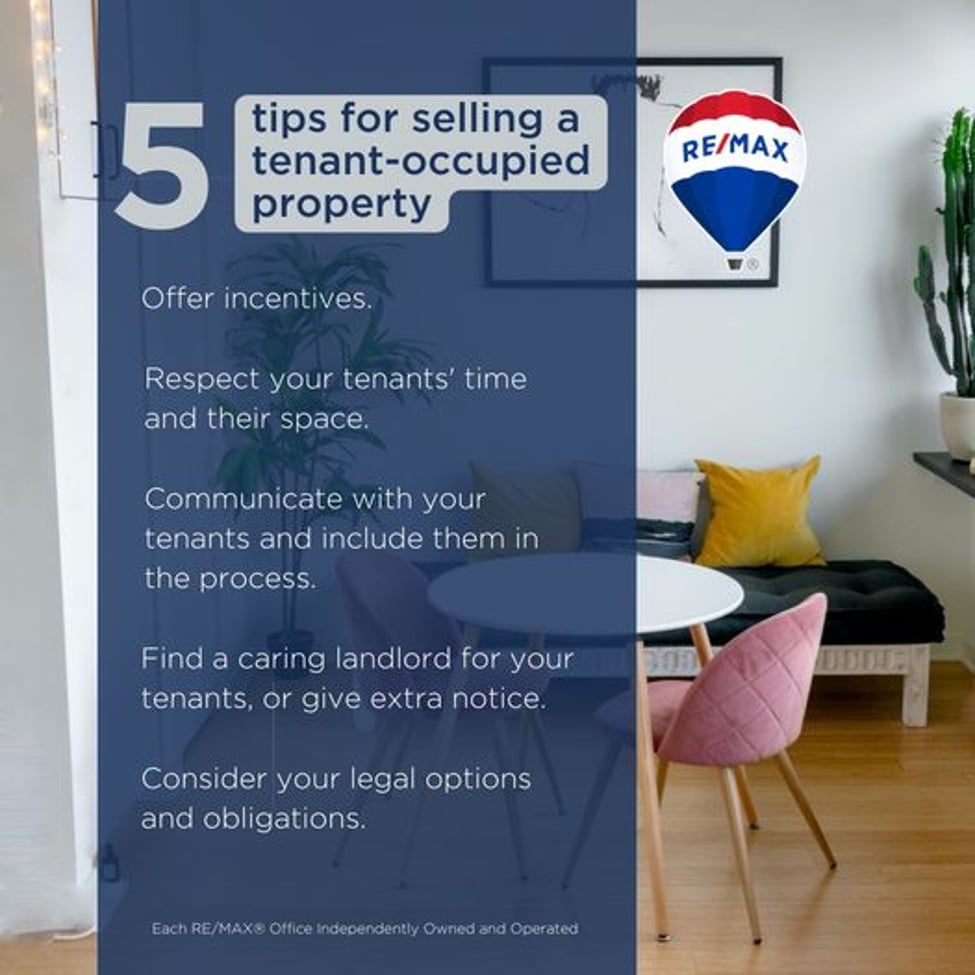When it comes to selling your property with tenants, there's a lot to consider. From securing the best price to ensuring a smooth transition for your tenants, it can be a complex process. To help guide you through, we've gathered valuable advice from RE/MAX agents across Canada.
There is a lot to think about when you’re in the process of selling your property. There are moments of uncertainty as you hope to sell for the best possible price within a reasonable amount of time. The process can also be stressful for your tenant, who may be concerned about where they will live after the sale. We reached out to RE/MAX agents across Canada, to get their best advice on selling a tenant-occupied property.
Tips for Selling a Tenant-Occupied Property
Offer incentives
Several RE/MAX agents suggested that it’s a kind gesture to offer some sort of incentive to tenants during the time while the house is being listed.
A slight reduction in rent could mean a lot to your tenant if you’re in a financial position to offer the discount. Other options may include offering maid and cleaning services free of charge, giving your renter gift cards for restaurants, local shops, or movie theatres, or even throwing in a nice bottle of wine. These gestures may be of minimal cost to you but can go a long way to making the process smoother.
A happy tenant is far more likely to be cooperative and helpful during the listing process.
Respect their time
Until your property is sold, it is important to respect the fact that it is still the place your tenant calls “home.” It’s important to be open and honest with showing timelines and schedules.
One tip is to determine days and times of the week for showings that are most convenient for your tenant. Once those times are determined, advise your real estate agent to book during that schedule.
“When people feel heard and are a part of the process, they are much more likely to work with you rather than against you.”
Above all, don’t forget to respect laws about giving adequate notice to your tenant before a showing.
Work together and communicate
By working together, the situation may end up being a win-win for both yourself and your tenant.
Coach them through how to show potential buyers they are great tenants so that the new buyers may want to keep renting to them. The more cooperative, clean, and tidy the tenant is, the more likely they won’t have to move if an investor is purchasing the home.
It’s a good idea to have your real estate agent introduce him or herself to your tenant early in the process so that they can explain what will be happening and how the renter may be impacted. In some cases, real estate agents may be able to act as an intermediary to keep the flow of conversation going.
“Try to make your tenant feel part of the team. Have all documentation available regarding the legal positions of all involved. Manage expectations proactively.”
Help them out
Do your best to find someone who will either continue to be a landlord for your tenant or be sure to give your tenant more than the minimum notice required by law. Some sellers take this a step further by waiving the rent payment for the final month of the renter’s occupancy if they are helpful during the selling process.
In situations where the tenant is forced to move out following the sale, you may want to offer assistance in helping them locate a new place to live.
By helping your tenant, he or she will feel more positively about the situation and will likely return the favour by being more cooperative throughout the time your property is listed.
Consider your legal options
Nobody will contend the fact that selling a property that is occupied by a tenant can be challenging. But it is not impossible. Indeed, there are plenty of legal options at landlords’ disposal to sell rental properties.
Unsure what legal options are available? Here are some tips for selling a tenant-occupied property:
The first is to communicate with your tenant as soon as possible and keep the person regularly updated. During your communication – and have it in writing! – offer them information that you are planning to sell, how it might impact their living conditions, and requests for specific times for showing and inspections.
Another proposal from industry experts is to provide incentives to your tenant so that you can incentivize cooperation. This could include everything from waiving last month’s rent or reducing rent. If possible, you might even think about selling the residential property to the tenant, which could save time, hassle, and money.
Consider an early termination clause or cash for keys. Put simply, if your lease agreement contains an early termination clause, you can end the lease before the expiration date as long as you have the common courtesy to give proper notice. You could always provide a cash incentive to move out voluntarily prior to the end of the lease.
Ultimately, combing your local housing laws and regulations is crucial to ensure that you are not violating the law. The best option is to consult with a real estate attorney or real estate agent who specializes in tenant-occupied properties.
If anything goes sideways, you may need to pursue a judgment through your provincial landlord & tenant board or tribunal. However, this can be a lengthy process – in Ontario, it can take as long as a year for a hearing.
